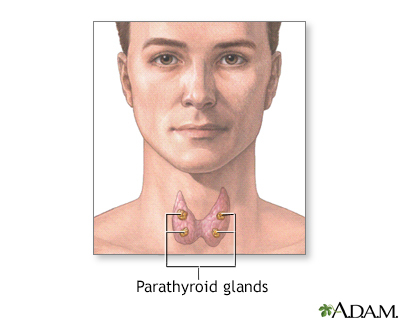Parathyroid cancer
Definition
Parathyroid cancer is a cancerous (malignant) growth in a parathyroid gland.
Alternative Names
Parathyroid carcinoma
Causes
The parathyroid glands control the calcium level in the body. There are 4 parathyroid glands, 2 on top of each lobe of the thyroid gland, which is located at the base of the neck.
Parathyroid cancer is a very rare type of cancer. It affects men and women equally. The cancer often occurs in people older than 30.
The cause of parathyroid cancer is unknown. People with a genetic conditions called multiple endocrine neoplasia type I and hyperparathyroidism-jaw tumor syndrome have an increased risk for this disease. People who had head or neck radiation also may be at increased risk. But this type of radiation is more likely to cause thyroid cancer.
Symptoms
Symptoms of parathyroid cancer are mainly caused by a high level of calcium in the blood (hypercalcemia), and may affect different parts of the body.
Symptoms include:
- Bone pain
- Constipation
- Fatigue
- Fractures
- Frequent thirst
- Frequent urination
- Kidney stones
- Muscle weakness
- Nausea and vomiting
- Poor appetite
Exams and Tests
Parathyroid cancer is very hard to diagnose.
Your doctor will perform a physical exam and ask about your medical history.
About half of the time, a provider finds parathyroid cancer by feeling the neck with the hands (palpation).
A cancerous parathyroid tumor tends to produce a very high amount of parathyroid hormone (PTH). Tests for confirming a diagnosis of parathyroid carcinoma may include:
Before surgery, you will have a special radioactive scan of the parathyroid glands. The scan is called the sestamibi scan. You may also have a neck ultrasound. These tests are done to confirm which parathyroid gland is abnormal.
Treatment
The following treatments may be used to correct hypercalcemia due to parathyroid cancer:
- Fluids through a vein (IV fluids)
- A natural hormone called calcitonin that helps control calcium level
- Drugs that stop the breakdown and reabsorption of bones in the body
Surgery is the recommended treatment for parathyroid cancer. Sometimes, it is hard to find out if a parathyroid tumor is cancerous. Your doctor may recommend surgery even without a confirmed diagnosis. Minimally invasive surgery, using smaller cuts, is becoming more common for parathyroid disease.
If tests before the surgery can find the affected gland, surgery may be done on one side of the neck. If it isn't possible to find the problem gland before surgery, the surgeon will look at both sides of your neck.
Chemotherapy and radiation don't work well to prevent the cancer from coming back. Radiation may help reduce the spread of cancer to the bones.
Repeated surgeries for cancer that has returned may help:
- Improve the survival rate
- Reduce the severe effects of hypercalcemia
Outlook (Prognosis)
Parathyroid cancer is slow growing. Surgery may help extend life even when the cancer spreads.
Possible Complications
The cancer may spread (metastasize) to other places in the body, most often the lungs and bones.
Hypercalcemia is the most serious complication. Most deaths from parathyroid cancer occur due to severe, difficult-to-control hypercalcemia, and not the cancer itself.
The cancer often comes back (recurs). Further surgeries may be needed. Complications from surgery can include:
- Hoarseness or voice changes as a result of damage to the nerve that controls the vocal cords
- Infection at the site of surgery
- Low level of calcium in the blood (hypocalcemia), a potentially life-threatening condition (presenting as twitching movements or even seizures)
- Scarring
When to Contact a Medical Professional
Contact your health care provider if you feel a lump in your neck or experience symptoms of hypercalcemia.
Gallery

References
Asban A, Patel AJ, Reddy S, Wang T, Balentine CJ, Chen H. Cancer of the endocrine system. In: Niederhuber JE, Armitage JO, Doroshow JH, Kastan MB, Tepper JE, eds. Abeloffs Clinical Oncology. 6th ed. Philadelphia, PA: Elsevier; 2020:chap 68.
Fletcher CDM. Tumors of the thyroid and parathyroid glands. In: Fletcher CDM, ed. Diagnostic Histopathology of Tumors. 5th ed. Philadelphia, PA: Elsevier; 2021:chap 18.
National Cancer Institute website. Parathyroid cancer treatment (PDQ) - health professional version. www.cancer.gov/types/parathyroid/hp/parathyroid-treatment-pdq. Updated July 22, 2020. Accessed May 17, 2022.
Related specialties
Our locations
Our experts
Community and Patient Programs: Parathyroid cancer
Our community and patient programs provide great value to patients, families and loved ones. People can find support, educational materials, expert consultants and more. In most instances, these programs are offered free of charge.
-
Adult Cancer Survivorship Program
Improves health and quality of life for long-term cancer survivors.
-
Cancer Connections
An educational and networking event that brings together cancer patients, survivors, caregivers and health care professionals.
-
Pain Management - Cancer
Pain management treatment plans for cancer patients.
-
Project CONTINUITY
Helps individuals access high-quality cancer screening, prevention and treatment services.
-
Social Workers for Cancer Patients
Can assist you through the treatment process in a number of practical and supportive ways.
